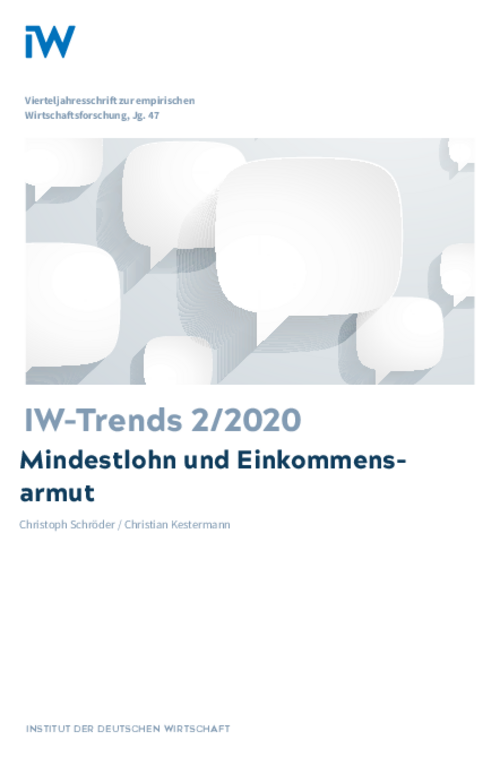There are currently loud calls for an increase in the minimum wage to 12 euros to ensure that it adequately covers the cost of living. However, the net income of a single person working full-time at the present minimum wage is already very close to the at-risk-of-poverty threshold.

The Minimum Wage and Income Poverty
IW-Trends

There are currently loud calls for an increase in the minimum wage to 12 euros to ensure that it adequately covers the cost of living. However, the net income of a single person working full-time at the present minimum wage is already very close to the at-risk-of-poverty threshold.
Indeed, in most European countries the national threshold is actually exceeded. This makes raising the minimum wage seem a relatively blunt instrument for reducing the risk of poverty. In 2018, for example, of the full-time employees who were receiving an hourly wage between the then minimum and 10 euros, only 13 per cent were technically income poor. This was 4 percentage points below the population average. Working hours have an important influence on the risk of poverty. At 26 per cent, the proportion of income poverty among part-time employees with an hourly wage of between 8.84 euros and 10 euros was almost twice as high as among full-time employees. A simulation calculation shows that, even if it was universally observed, an increase in the minimum wage to 12 euros would reduce the income poverty rate by little more than a single percentage point. On the other hand, a sharp increase in the minimum wage is likely to impact negatively on working hours and employment – especially in view of the imminent threat of severe recession. Further compression of the wage structure would also reduce the incentives for low-skilled workers to undergo vocational training.

Christoph Schröder / Christian Kestermann: Mindestlohn und Einkommensarmut
IW-Trends

More on the topic

IW Distribution Report 2023: Attitudes towards social mobility
Fundamentally linked to the social market economy is the idea that everyone has the opportunity for social advancement, regardless of their social background, and that children should be better off than their parents.
IW
A Focus on the Middle Class - Demarcation, Development and Mobility
In 2018, roughly every second German was a member of the middle class as measured by income, a proportion which has barely changed for more than a decade. However, the lower income threshold of this middle-income group has risen - an indication of increased ...
IW